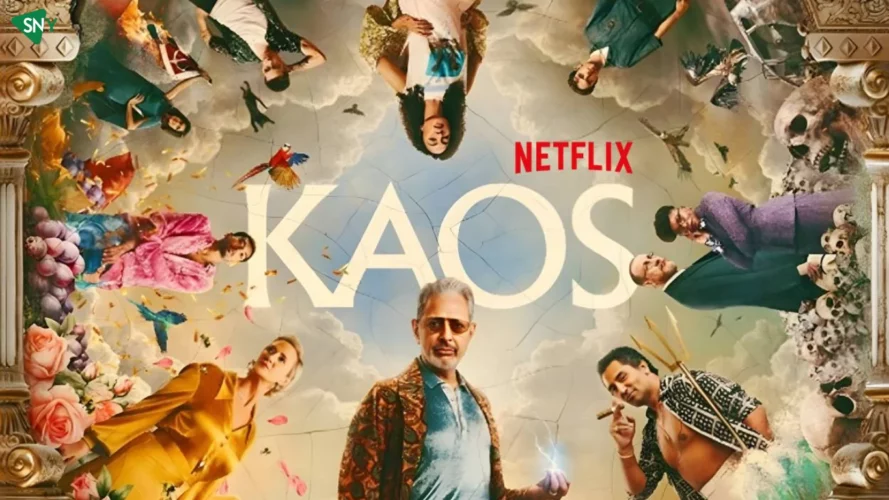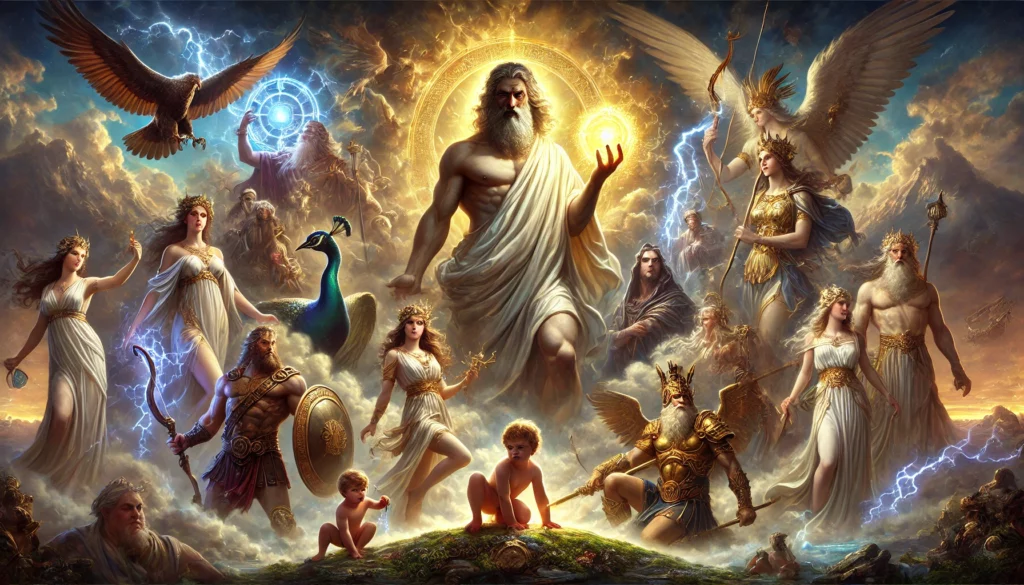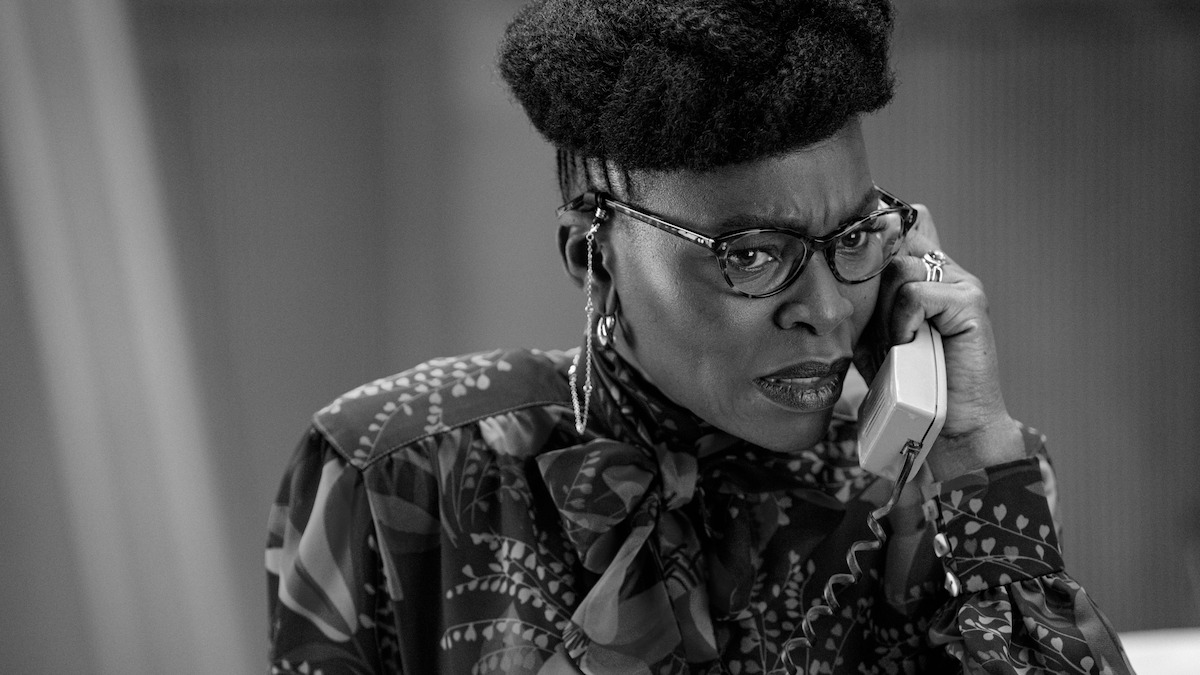Contents
- 1 Kaos TV Series Review: A New Pantheon in Television
- 2 Plot: Myths Retold, Futures Reimagined
- 2.1 RelatedPosts
- 2.2 A Minecraft Movie Review: A Super-Fun Blocky Adventure That Nails the Sandbox Spirit
- 2.3 Death of a Unicorn Review: A Satirical Stab at Fantasy Horror
- 2.4 The Gentlemen (2024 TV Series) – A Stylish Crime Caper That’s More Than Just a Spin-Off
- 2.5 Jeff Goldblum as Zeus: A Scene-Stealing Performance
- 2.6 The Tragic Love of Orpheus and Eurydice
- 3 The Gods’ Harvest: Mortal Souls as Immortal Sustenance
- 4 Analyzing Kaos‘ Technical Aspects: A Divine Spectacle
- 5 Character Performances: Mortal and Divine
- 6 Cultural Impact: Myths for the Modern Age
- 7 Comparing Kaos’ Storyline to Greek Mythology: Faithful or Too Free?
- 8 Summing Up: Is the 2024 TV Series Kaos a Chaotic Masterpiece?
Charlie Covell’s Kaos, directed by Georgi Bank-Davies and Runyararo Mapfumo, reinvents Greek mythology with bold creativity, bringing gods, mortals, and monsters to life in ways both thrilling and deeply human. The 2024 Netflix series promises a blend of epic storytelling and modern sensibilities, wrapped in lush visuals and biting commentary. But does it deliver on its Olympian ambition?
Beware of spoilers. 🙂
Kaos TV Series Review: A New Pantheon in Television
Plot: Myths Retold, Futures Reimagined
Kaos
unfolds through interconnected narratives, each revisiting iconic mythological tales. At its heart is Orpheus, a mortal who defies death, challenging the gods’ authority and reshaping the destinies of all around him.

Alongside Orpheus, the series explores the Minotaur’s tragedy, Persephone’s entrapment in the underworld, and Zeus’s struggle to maintain control as secrets from the past unravel. Each thread weaves together ancient lore with modern dilemmas, from power struggles to existential questions about identity and agency.
Related: The Lord of the Rings: The Rings of Power Season 2 – An Epic Saga that Continues to Dazzle
Kaos‘ writing is both sharp and layered, with Covell’s hallmark wit infusing humor into even the darkest moments. The pacing balances epic spectacle with intimate character beats, though some subplots feel undercooked amidst the sprawling narrative.
Jeff Goldblum as Zeus: A Scene-Stealing Performance
Jeff Goldblum’s portrayal of Zeus is a standout, bringing a magnetic charm and sly wit to the king of the gods. Goldblum’s Zeus is a fascinating paradox—all-powerful yet deeply insecure, domineering yet strangely relatable. His penchant for dry humor and eccentricity adds layers to the character, making Zeus both an awe-inspiring deity and a deeply flawed patriarch. Goldblum’s performance anchors the series, his charisma elevating even the most mundane moments to something extraordinary.

Through Goldblum, Zeus’s paranoia and vulnerability become palpable. His interactions with other gods—particularly Hera, whose icy cunning contrasts sharply with his flamboyance—are electric. This nuanced depiction challenges traditional views of Zeus as merely a tyrannical ruler, offering a more intimate look at his internal struggles and the weight of divine responsibility.
The Tragic Love of Orpheus and Eurydice
Central to #Kaos is the heartrending love story of Orpheus (Killian Scott) and Eurydice (Aurora Perrineau), which serves as an emotional anchor for the TV series. Orpheus, devastated by Eurydice’s untimely death, ventures into the underworld to bring her back. His journey is fraught with peril and moral compromise, including his shocking decision to steal Eurydice’s coin, the payment required to cross the River Styx. This selfish act leaves Eurydice trapped in the underworld and sets in motion a chain of events that tests their love and Orpheus’s integrity.

With the intervention of the three Fates, Orpheus defies divine laws and succeeds in bringing Eurydice back to the land of the living. However, their reunion is bittersweet. The bond they once shared is irrevocably altered, and their love struggles to withstand the weight of their experiences.
Eurydice, yearning for connection and understanding, forms an unexpected bond with Caeneus (Misia Butler), a tragic figure who, like her, is unable to cross the River Styx. Caeneus’s heartbreak over being separated from his mother creates a poignant parallel to Eurydice’s sense of displacement, leading to a deep emotional connection between the two. This twist adds complexity to the narrative, exploring themes of love, loss, and the search for solace in unexpected places.
Related: Coping with Loss and Accepting It as a Truth of Life
The Gods’ Harvest: Mortal Souls as Immortal Sustenance
One of the most chilling aspects of Kaos is its depiction of how the gods sustain their own existence. They harvest human souls, a process shrouded in mystery and horror. This vampiric dependency adds a sinister layer to the gods’ seemingly invincible power, revealing their fragility beneath their divine exteriors. Zeus, in particular, is shown orchestrating this process with calculated precision, reinforcing his dominance while exposing his reliance on mortal lives.

The harvesting of mortal souls by the gods is not merely a backdrop but a key driver of the plot, reflecting the gods’ callousness and their disregard for human agency. This chilling dynamic serves as a stark reminder of the imbalance of power between mortals and immortals, deepening the audience’s understanding of why characters like Orpheus dare to challenge the divine order. The visual portrayal of this harvesting, with its eerie rituals and haunting imagery, leaves an indelible mark on the viewer, cementing the gods’ morally ambiguous nature.
Related: Freeing Yourself by Letting Go
Analyzing Kaos‘ Technical Aspects: A Divine Spectacle
Cinematography by Georgi Bank-Davies and Runyararo Mapfumo crafts a visually arresting series. Sweeping shots of Olympus’ opulence contrast with the gritty, labyrinthine underworld. Each realm boasts a distinct palette: golden hues for the gods, cold blues for Hades, and earthy tones for mortal lands. These visual cues enhance the storytelling, immersing viewers in a vibrant reimagining of the ancient world.
Related: The Lost City of Stone: Petra – A Testament to Ancient Ingenuity
The sets are a feast for the eyes, blending ancient motifs with contemporary aesthetics. Olympus feels both timeless and eerily futuristic, while the Minotaur’s labyrinth evokes a sense of dread and desolation. Costuming, too, deserves praise for its intricate detail—the gods’ attire is regal yet infused with modern flair, while mortals’ garb reflects their harsh realities.
The Minotaur: Kaos’s Shock Factor
Kaos
does not shy away from brutality. The Minotaur’s backstory is heart-wrenching, a visceral exploration of pothering and injustice. Scenes of captivity in the underworld are hauntingly raw, yet the series avoids gratuitous violence, grounding its shocks in emotional truth.
A mix of orchestral and modern electronic elements underscores the series. Key moments—Zeus’ confrontation with Prometheus (Stephen Dillane), for instance—are elevated by soaring scores that echo ancient tragedies. The soundtrack is memorable, if occasionally overwhelming.

Related: Why I Think About the Roman Empire
Character Performances: Mortal and Divine
The gods of Kaos are flawed, capricious, and painfully human. Jeff Goldblum’s Zeus exudes charisma and menace, his paranoia unraveling as secrets emerge. Hera’s icy cunning provides a sharp counterpoint to Zeus’ bluster, while Hades’ portrayal—torn between duty and longing—is heartbreaking and poignant.

The human characters provide the series’ emotional core. Orpheus’ defiance of divine authority is both inspiring and tragic, his journey anchored by a nuanced performance that captures vulnerability and resilience. Supporting players, like a reimagined Prometheus and the fiercely determined fate sisters, enrich the narrative with their own arcs.
The Minotaur emerges as one of the series’ most compelling figures. Reimagined as a misunderstood outcast, his story challenges traditional notions of monstrosity and humanity, delivering a gut-punching critique of fear and prejudice.
Cultural Impact: Myths for the Modern Age
Kaos
succeeds in making ancient myths resonate with contemporary audiences. Themes of power, corruption, and resistance feel eerily relevant, reflecting today’s sociopolitical climate. By humanizing gods and monsters alike, the series fosters empathy and prompts viewers to question binary notions of good and evil.

However, its bold reinterpretations may alienate purists. Some liberties—like the modernization of Persephone’s story as a happy queen of the underworld—sparked debate among fans and scholars. Yet these choices ultimately enrich the narrative, inviting fresh perspectives on age-old tales.
Comparing Kaos’ Storyline to Greek Mythology: Faithful or Too Free?
While Kaos honors the essence of Greek myths, it takes significant creative liberties. The gods’ complex personalities align with ancient portrayals, but their modernized dialogues and motivations veer into speculative territory. Purists might balk at deviations—such as a sympathetic Minotaur or a defiant Orpheus—yet these changes breathe new life into well-trodden stories.

Some departures feel less justified. Persephone’s arc, while powerful, sidelines Demeter’s grief, a crucial element of the original myth. The series’ focus on spectacle also occasionally detracts from deeper thematic explorations.
Summing Up: Is the 2024 TV Series Kaos a Chaotic Masterpiece?
Kaos
is an audacious reimagining of Greek mythology, blending epic drama with sharp social commentary. Its technical brilliance and compelling performances outweigh occasional missteps in pacing and narrative focus. Jeff Goldblum’s Zeus alone makes the series worth watching, his performance a masterclass in bringing larger-than-life characters to the screen.
Related: Epic Showdown: Gladiator 2 vs Those About to Die – Which Reigns Supreme?
Our Rating: 8.5/10
For fans of mythology and daring storytelling, Kaos is a must-watch for the year 2025—a series as flawed, grand, and unforgettable as the gods it portrays.
Watch the official Netflix Trailer for KAOS below. Courtesy of Netflix.
This article has been written with the help of A.I. for topic research and formulation.








